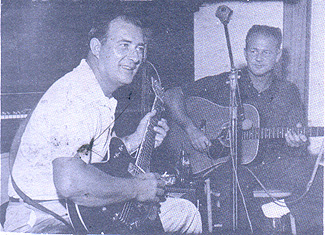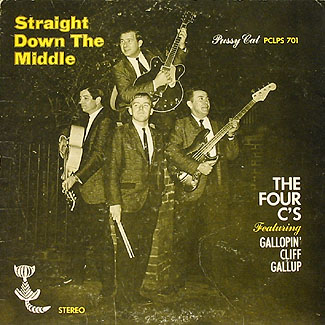|

Cliff Gifford with Rabbit Neathery.
A DJ in Norfolk, Virginia, Sheriff Tex Davis, became involved with managing Gene Vincent in February 1956, after hearing him in a talent show in Norfolk and later noting noticing his popular radio performances. Davis assembled a variety of local musicians to put together a band for Vincent. One of those musicians was a talented guitarist formerly of a local band called the Virginians. His name was Cliff Gallup.
ROLLINGSTONES 100 GREATEST GUITARIST
#79 Cliff Gallup
In the few months he spent as lead guitarist for Gene Vincent's Blue Caps in 1956, Gallup introduced the stylistic swagger that every rock guitarist now takes for granted. His slashing, razor-blade-in-the-ducktail assaults pushed the instrument one big step away from country picking and down the mean streets that rock & roll guitar has traversed ever since. "Race With the Devil," The Screaming End: The Best of Gene Vincent (1997)
When the session was set up to record Gene Vincent in Nashville, Country Music Hall of Fame producer, Ken Nelson, wasn't to sure the band from Norfolk was up to the challenge, so he had some Nashville session players on standby. As soon as Cliff started playing the solos on "Race with the Devil,"Nelson realized the session musicians were not needed. The next song recorded became Gene Vincent's biggest hit, "Be-Bop-A-Lula" Gallup played on 35 tracks with Vincent in sessions from May to October of 1956.
Clifton E. Gallup played his Gretsch guitar with a Fender Tweed amplifier, and produced the reverb that has come to be associated with much classic rockabilly by using echo units he constructed himself from parts from old tape recorders. He used a flat pick in conjunction with fingerpicks on his middle and ring fingers, using his little finger to work the vibrato bar. It is amazing that a guitarist of Gallup's phenomenal abilities had not recorded before 1956.
A married Gallup decided that life on the road was too much and he quit Gene Vincent and His Blue Caps after less than a year, although he cut a few more studio tracks with them.
In the 60s on a Norfolk, VA label called Pussy Cat, a group called The Four C's recorded a record, "Straight Down the Middle" featuring Gallopin' Cliff Gallup. It was a bit more mellow style, more like some other guitar giants, Chet Atkins and Les Paul.
Marriage influenced Gallup to get a steady job working in school maintenance but continued to play with local bands here and there.

Cliff Gallup could have made a career as a studio musician in Nashville or traveled on the road with any number of top artists, but even with his short career, he managed to influence some of the most celebrated guitarists in music, like Jeff Beck, who even made an album-length tribute to Gallup in 1993, “Crazy Legs.”
George Harrison’s first good guitar — the one he used on all the early Beatles tracks — was a black Gretsch Duo-Jet that was just like Gallup’s. Jimmy Page and Eric Clapton have also cited Gallup’s influence, and Brian Setzer’s entire sound, music, and technique are built from the Gallup blueprint.
Gallup brought a musical sophistication to Rockabilly.
At the time of his death in 1988, Gallup was the Director of Maintenance and Transportation for the Chesapeake, Virginia city school system, where he worked for almost 30 years
|





